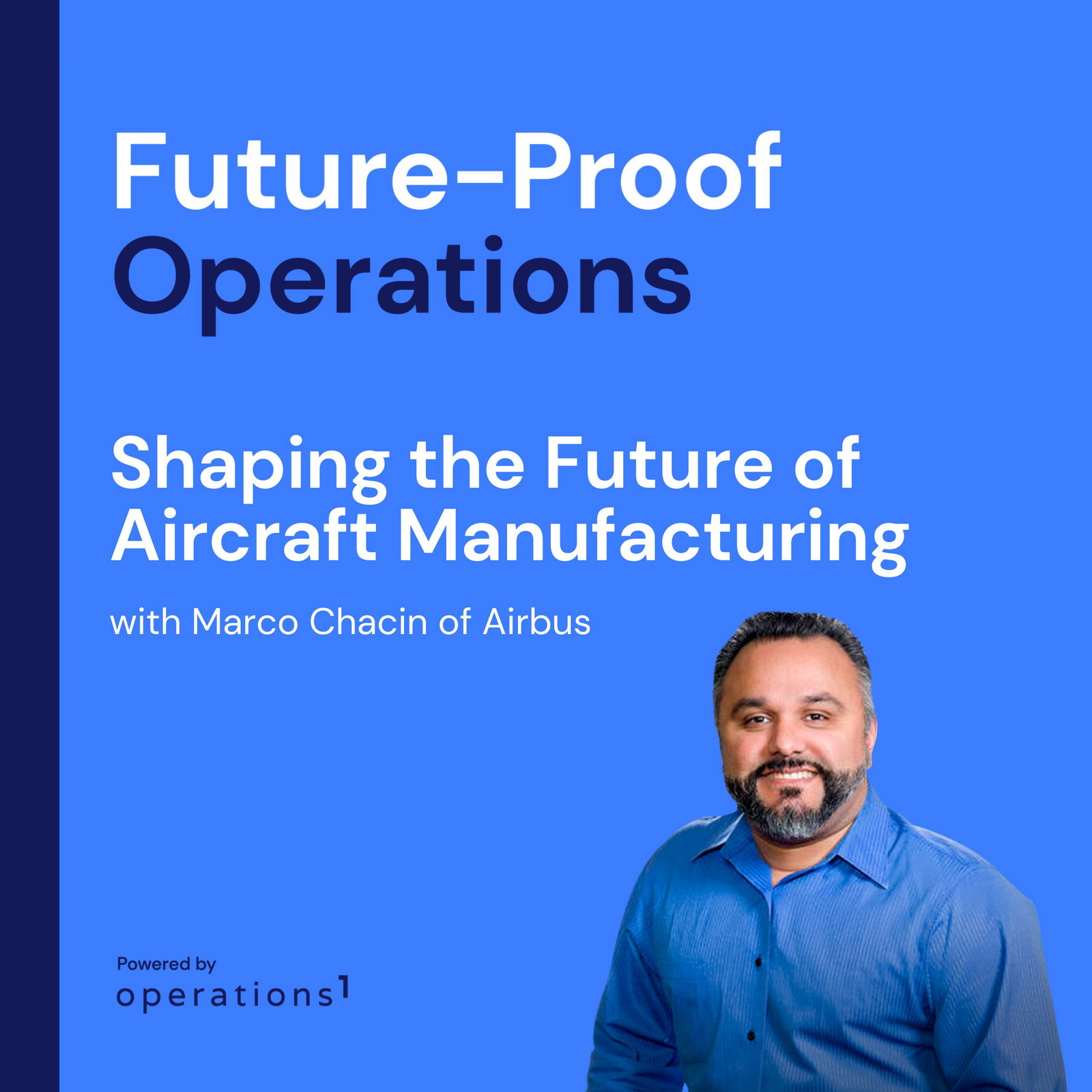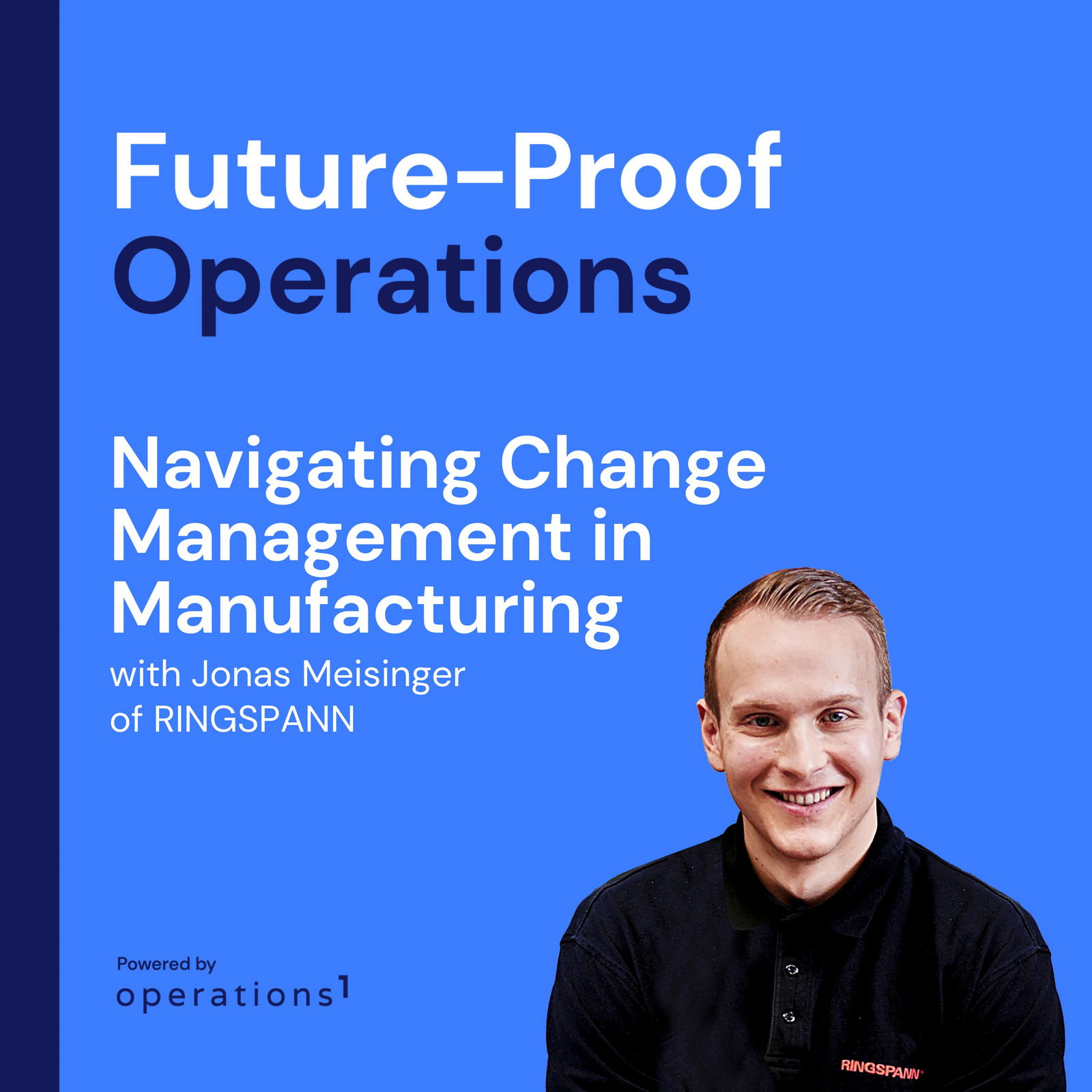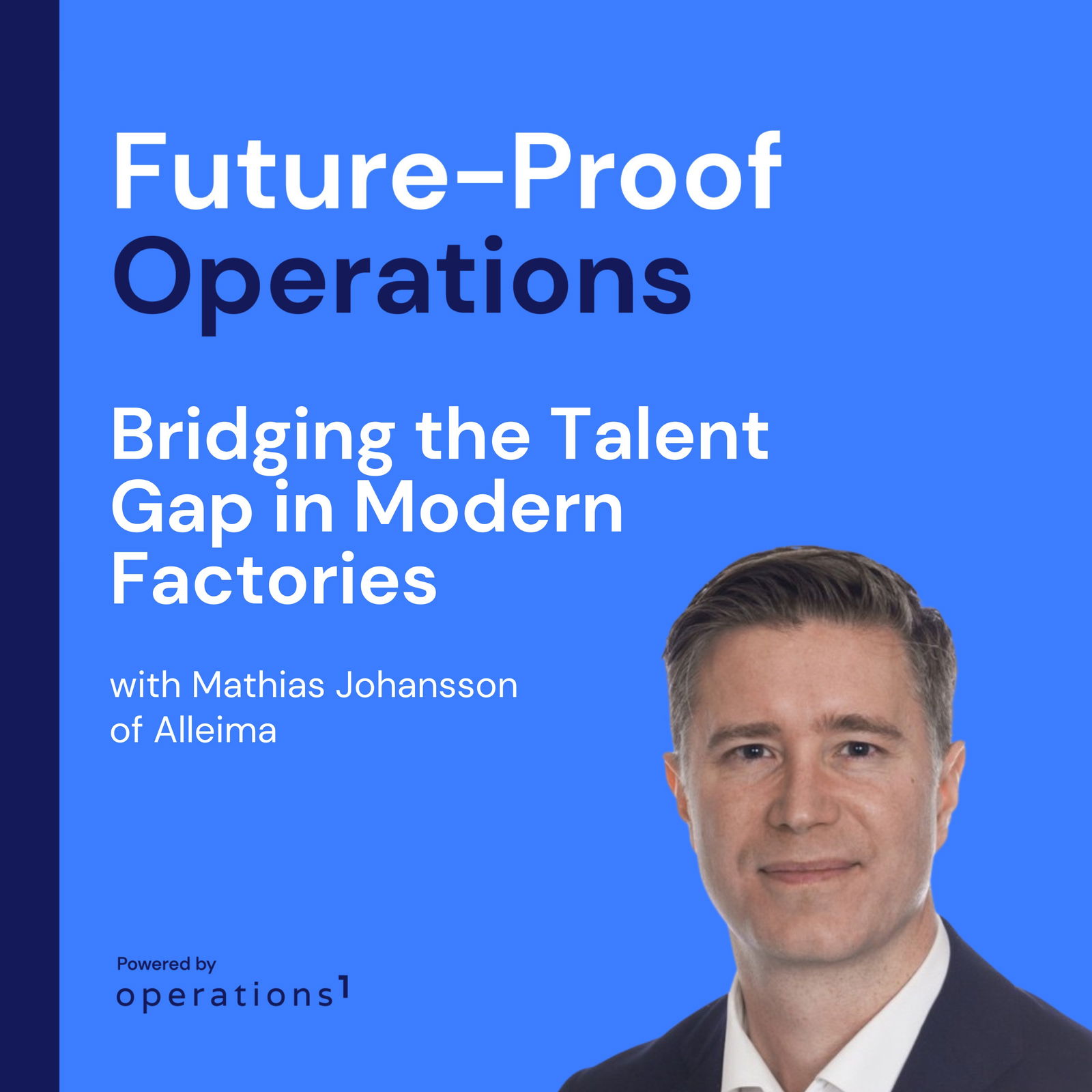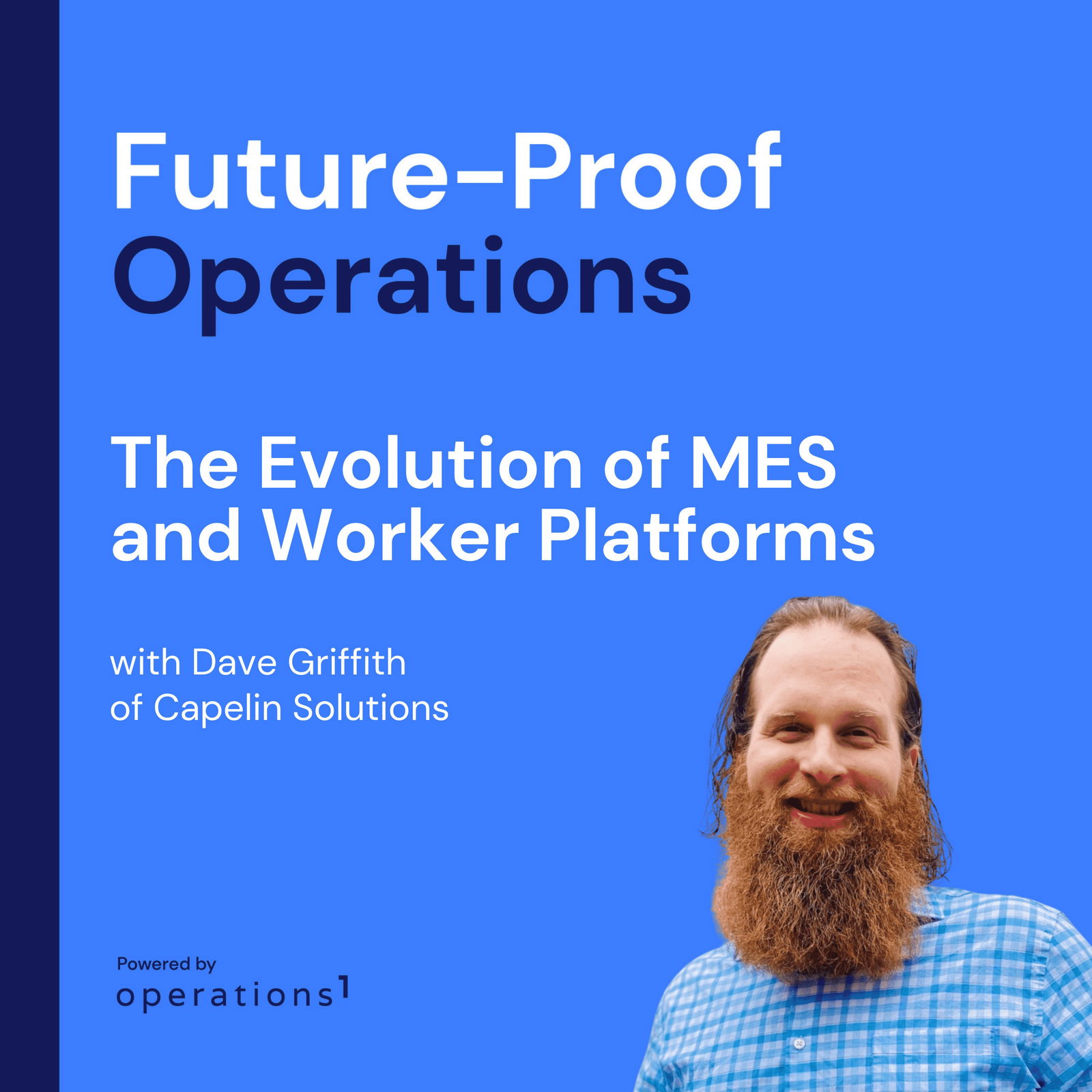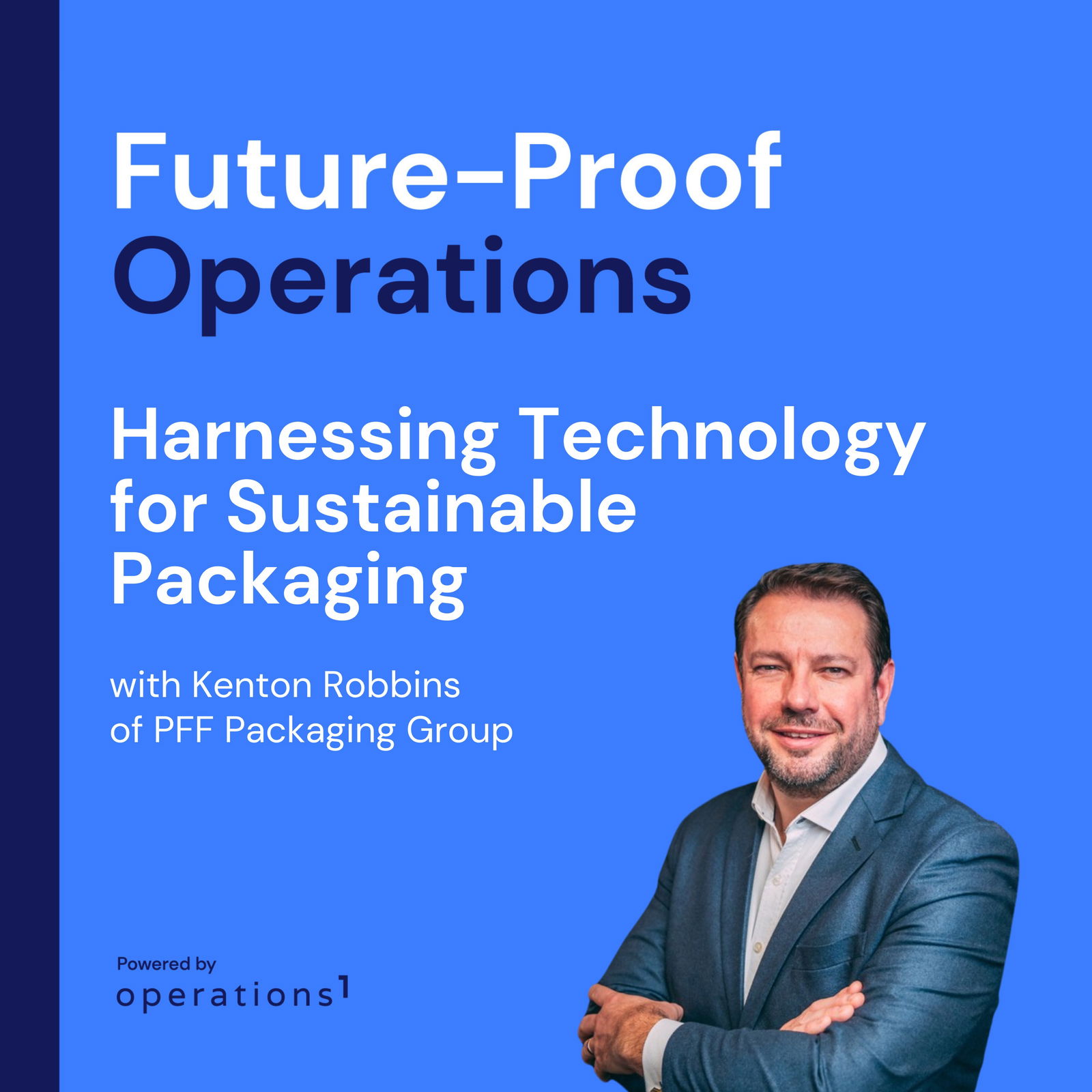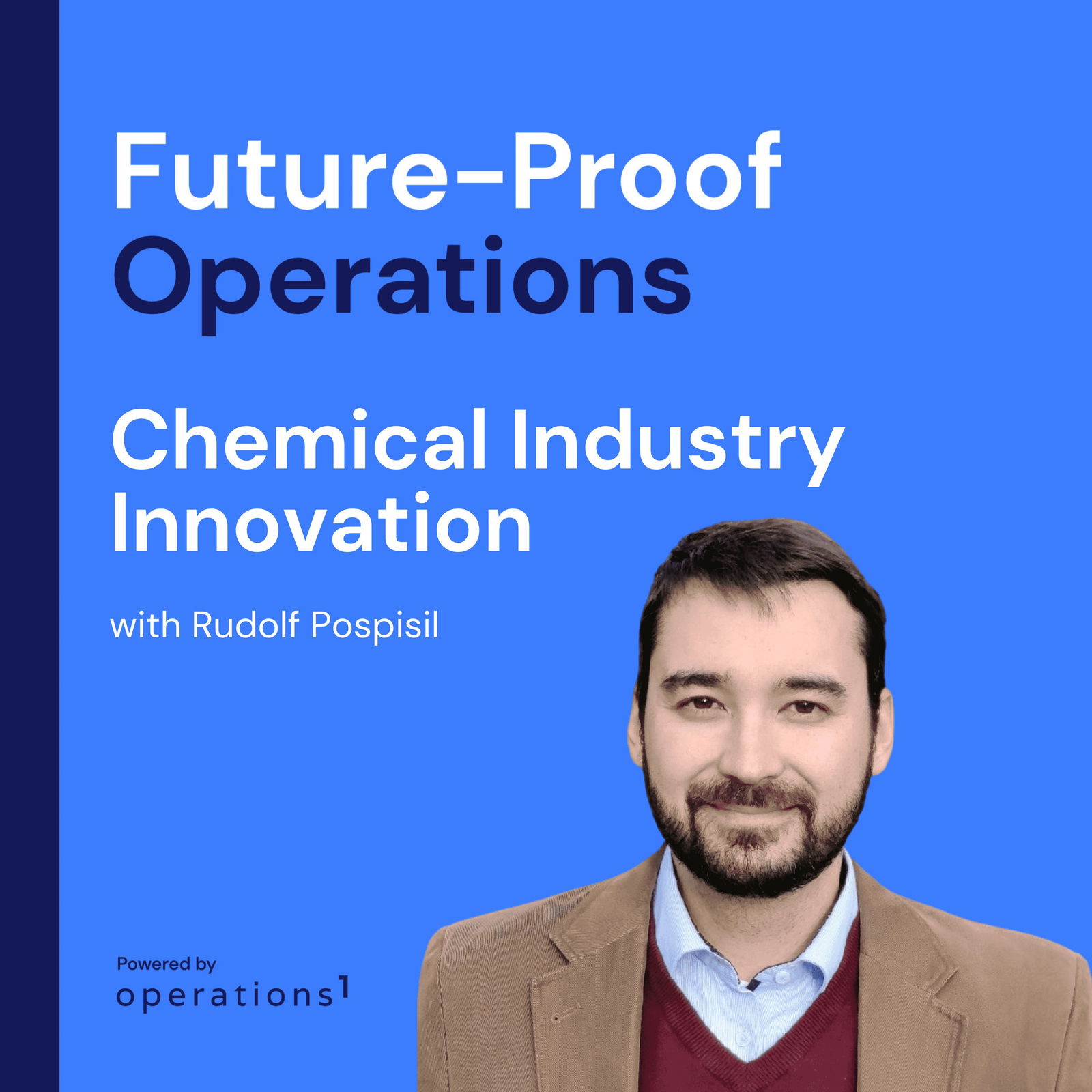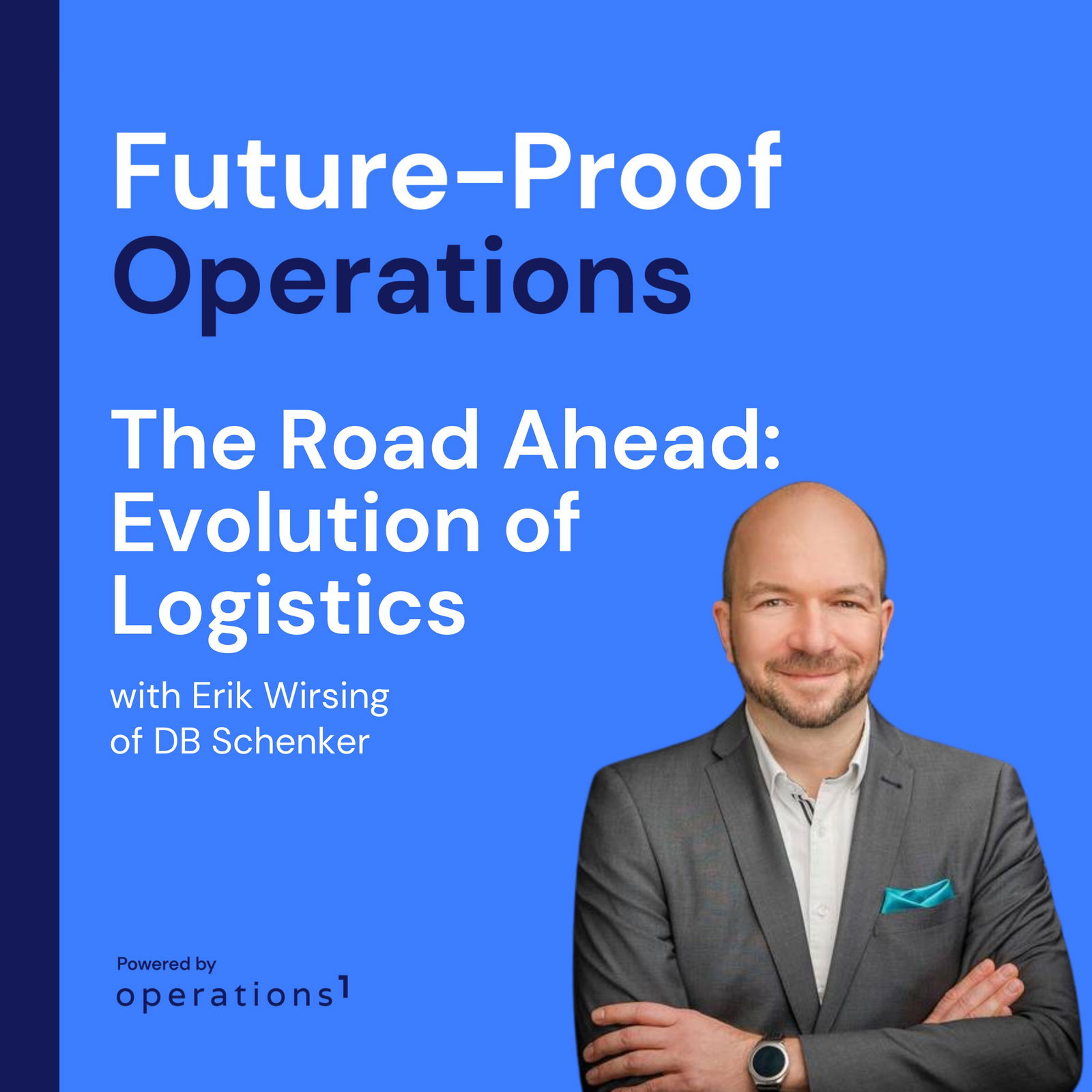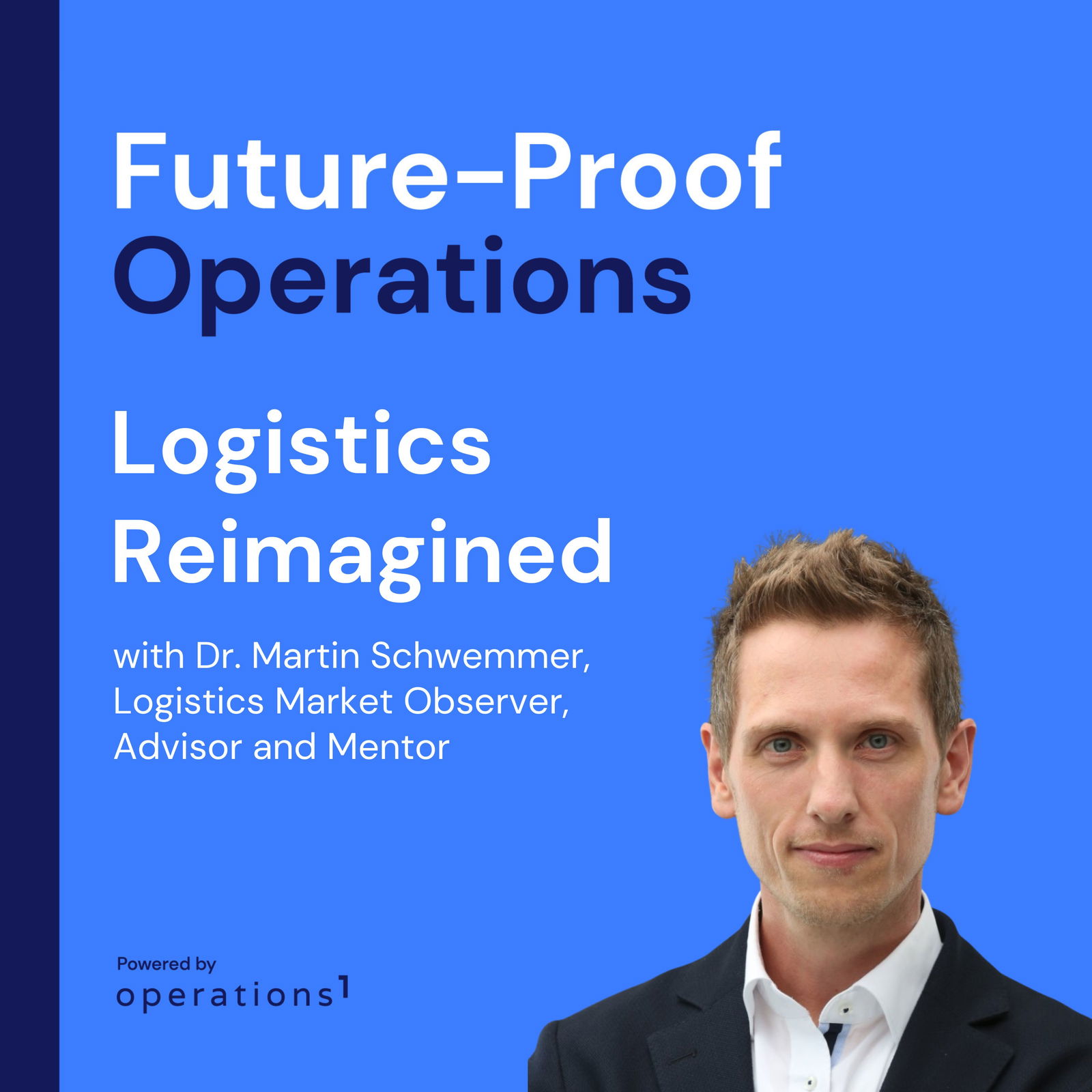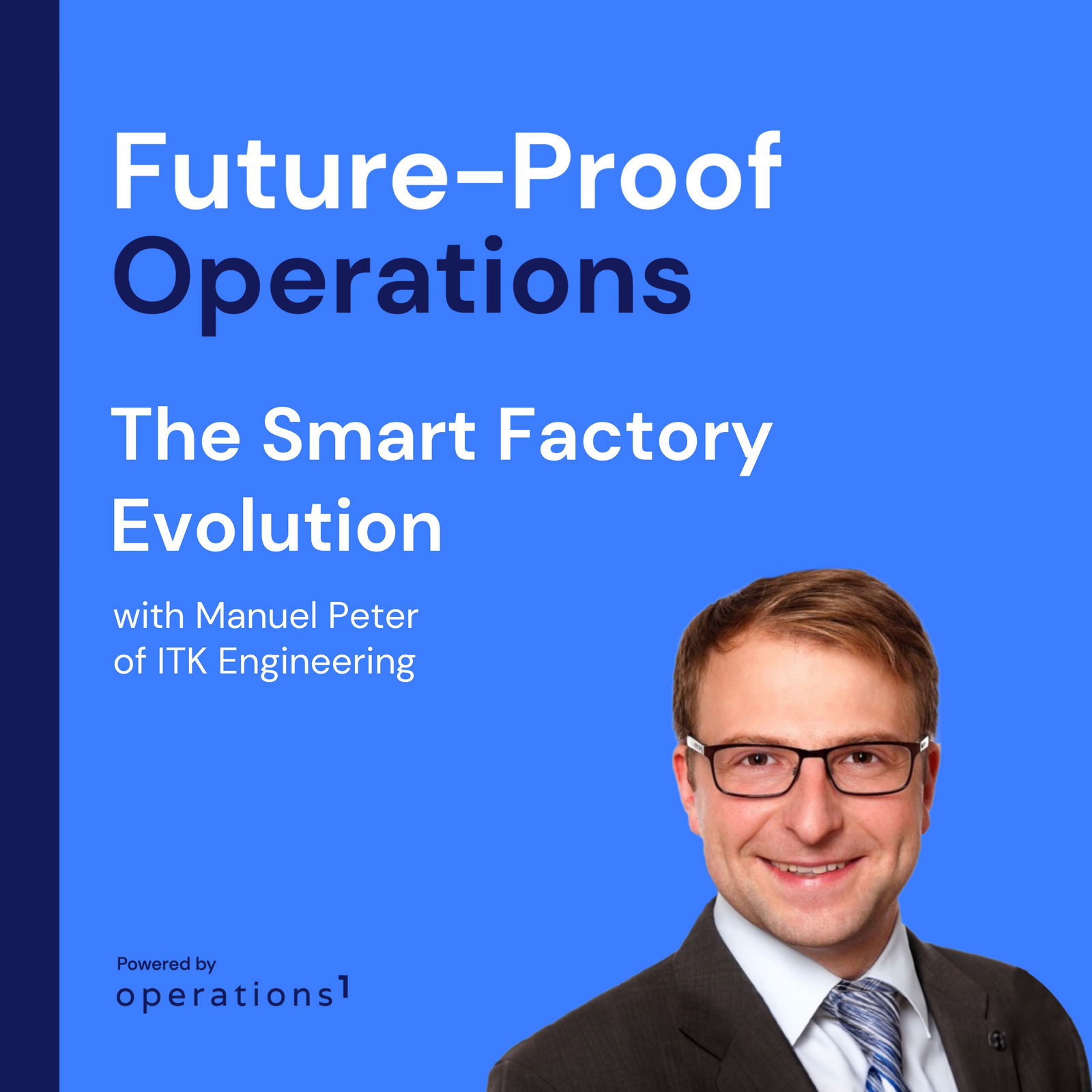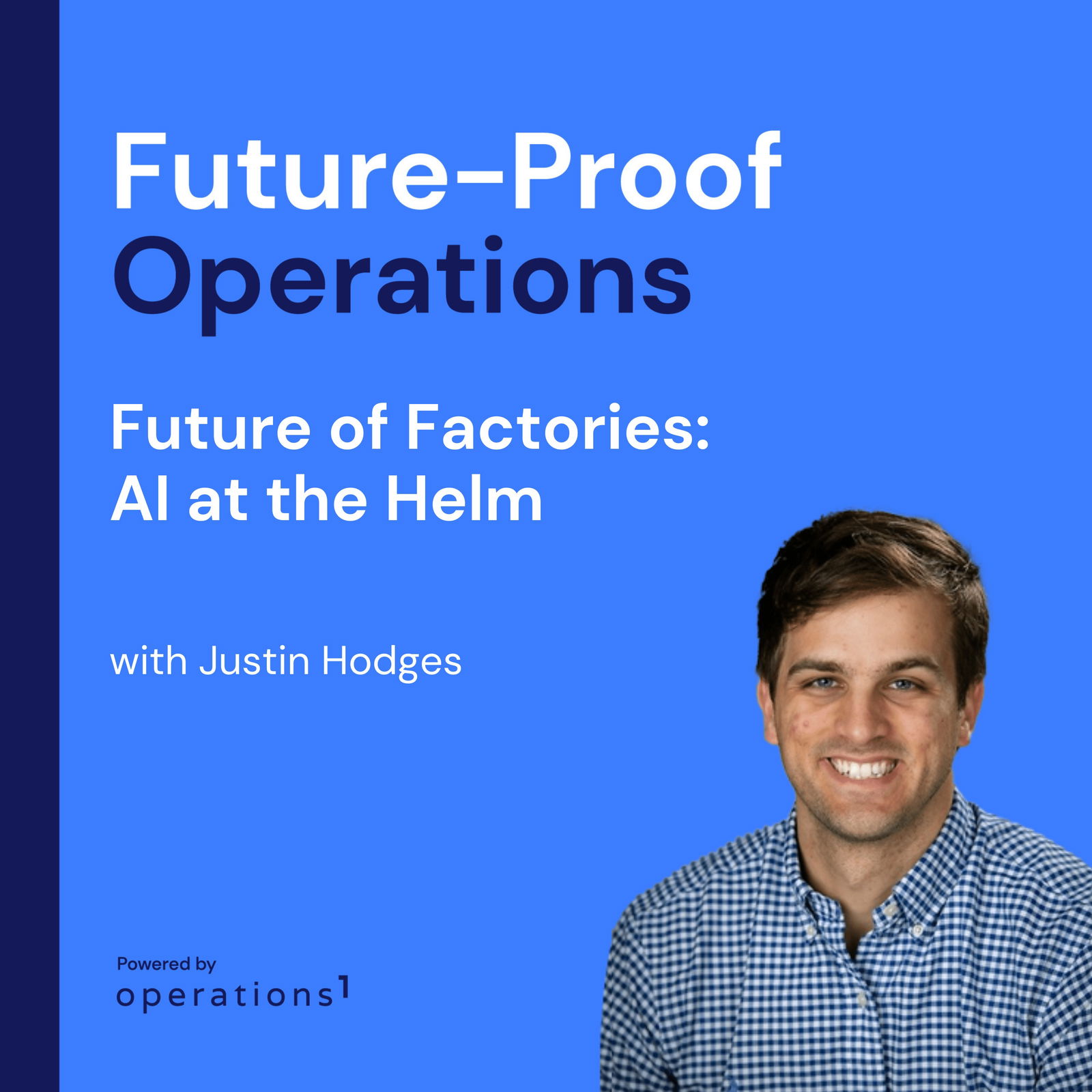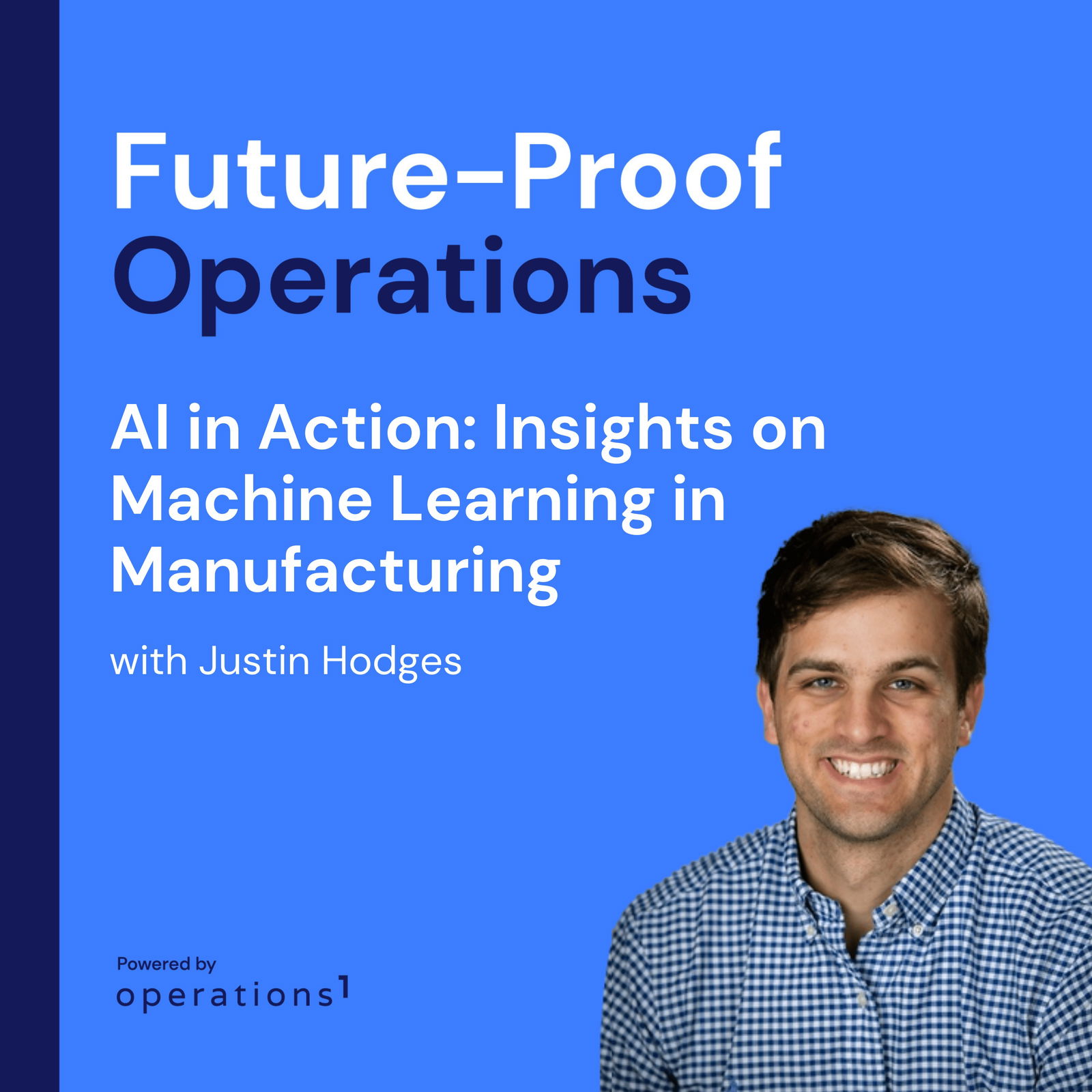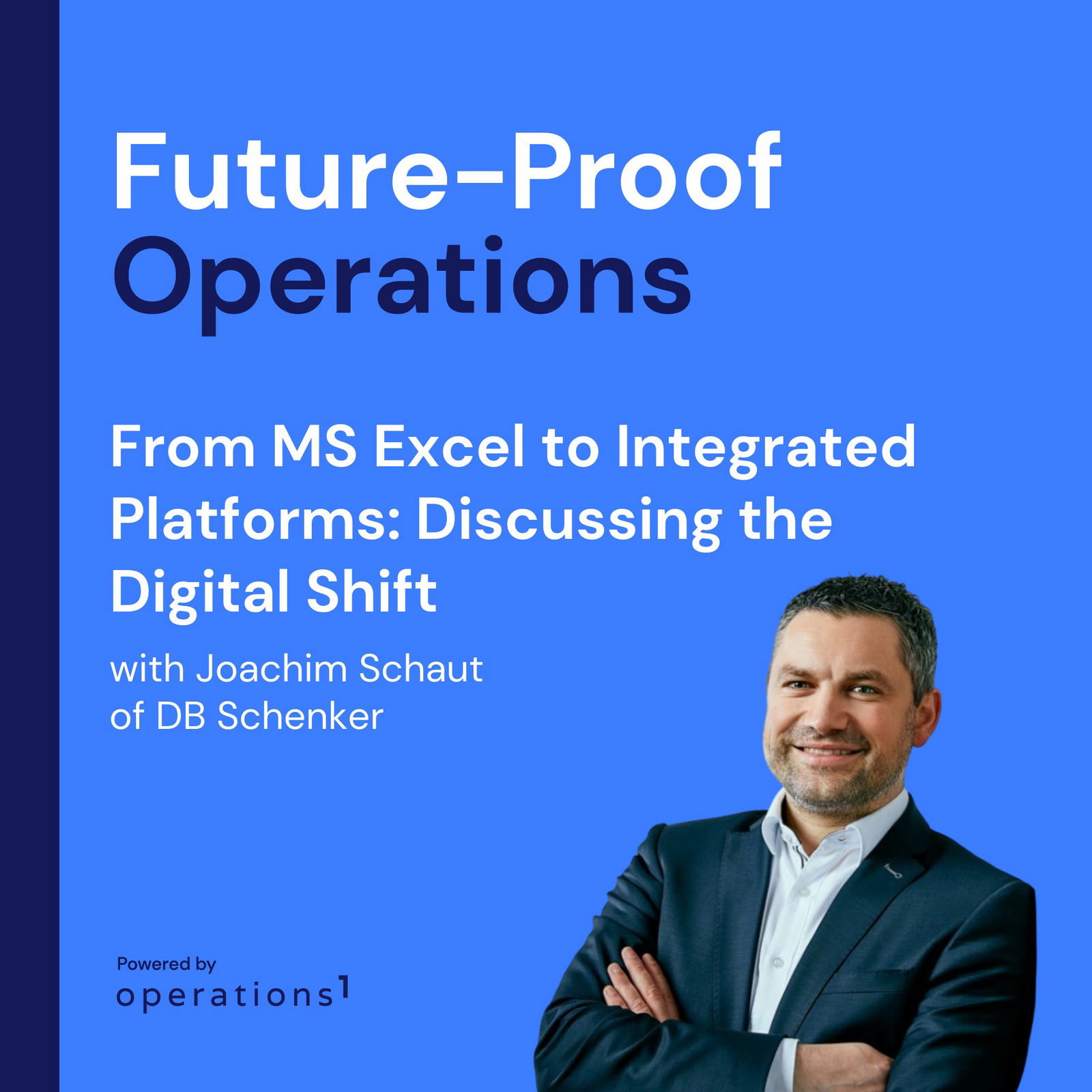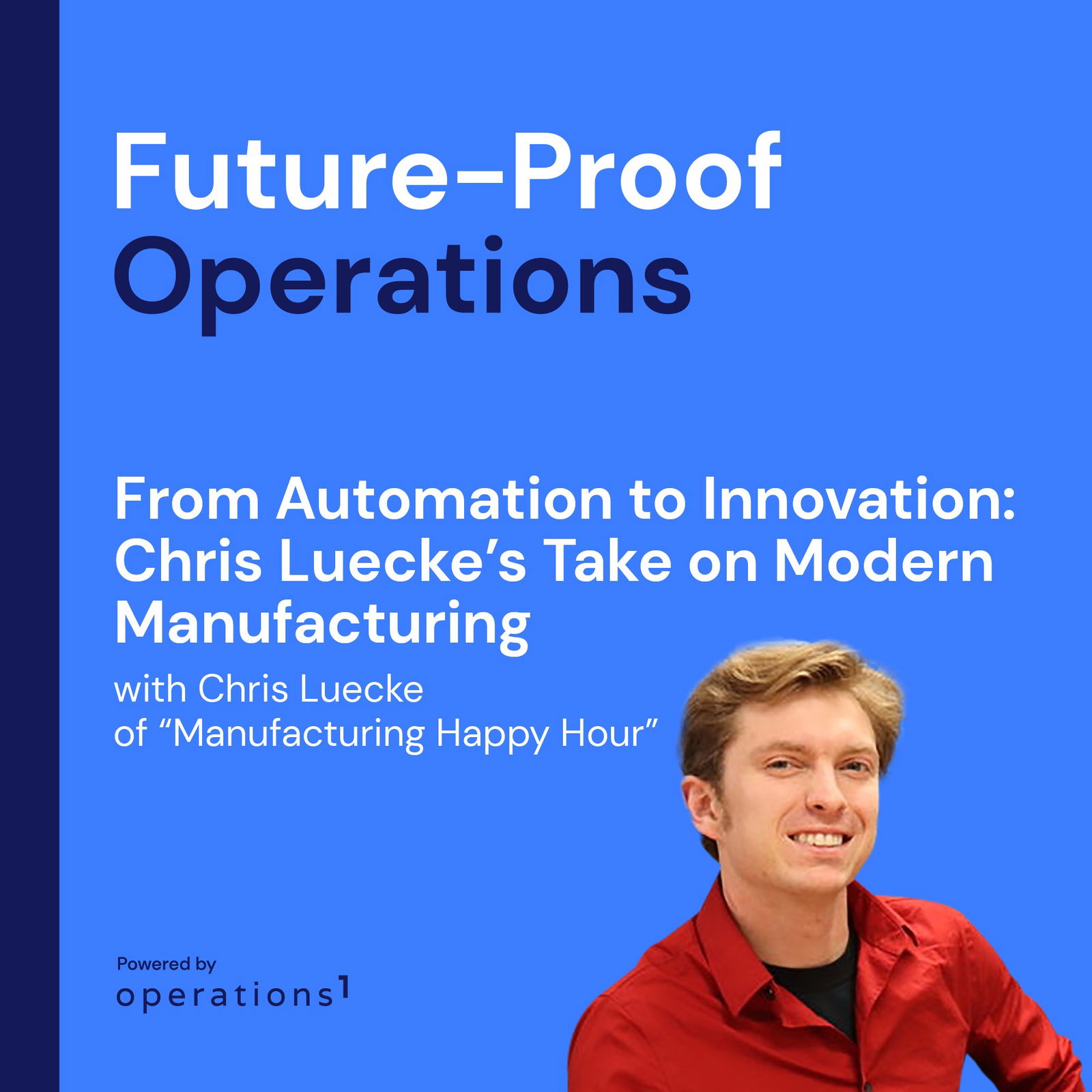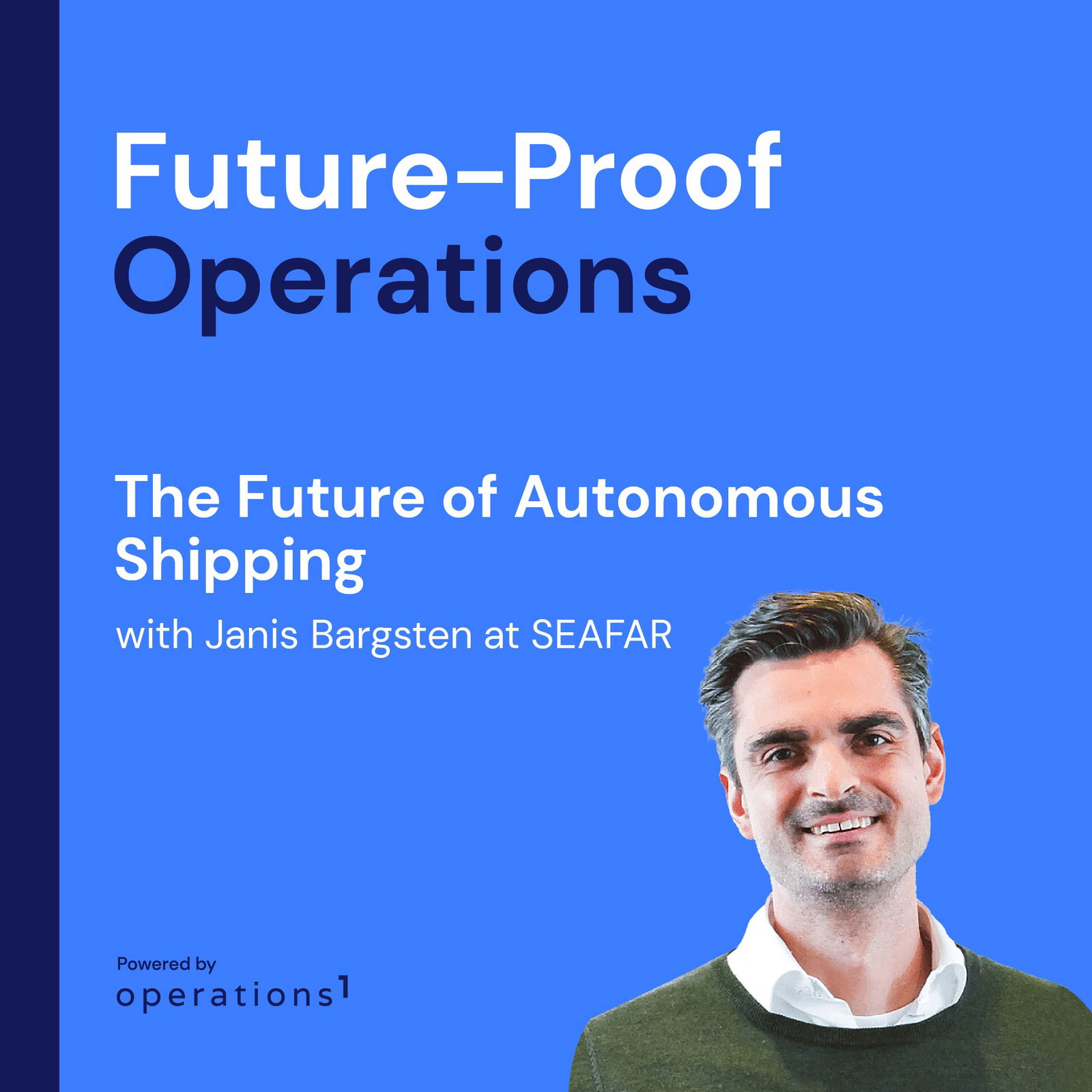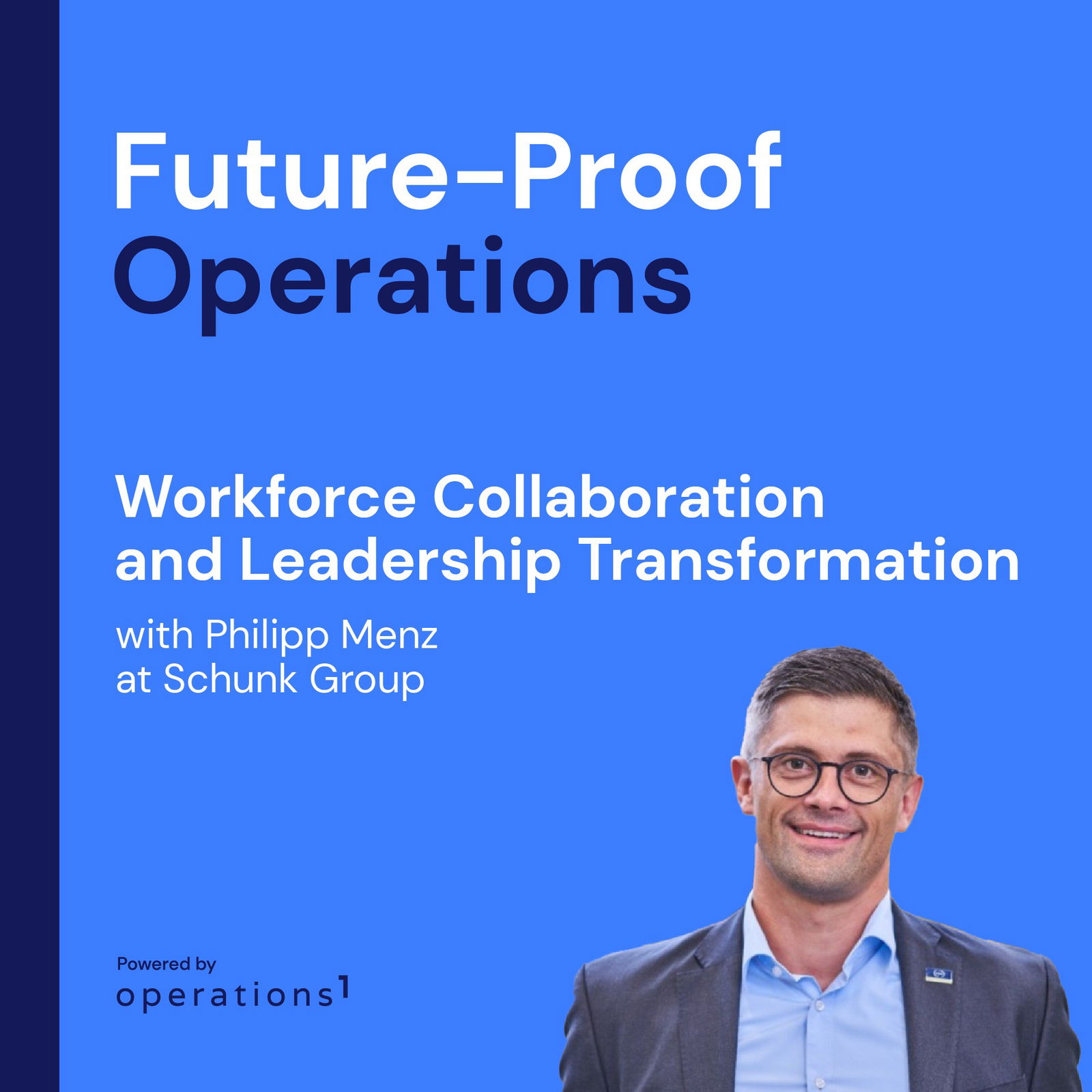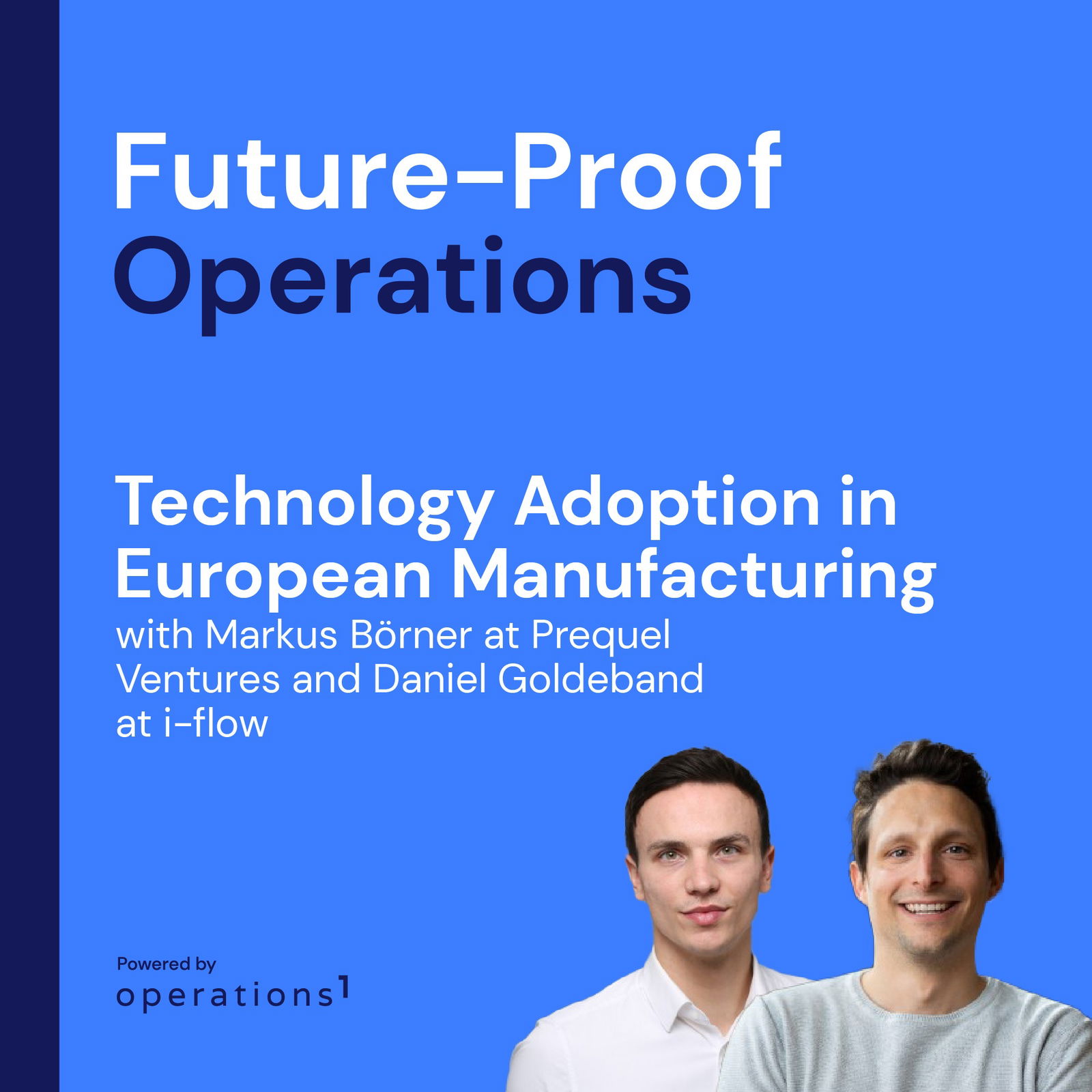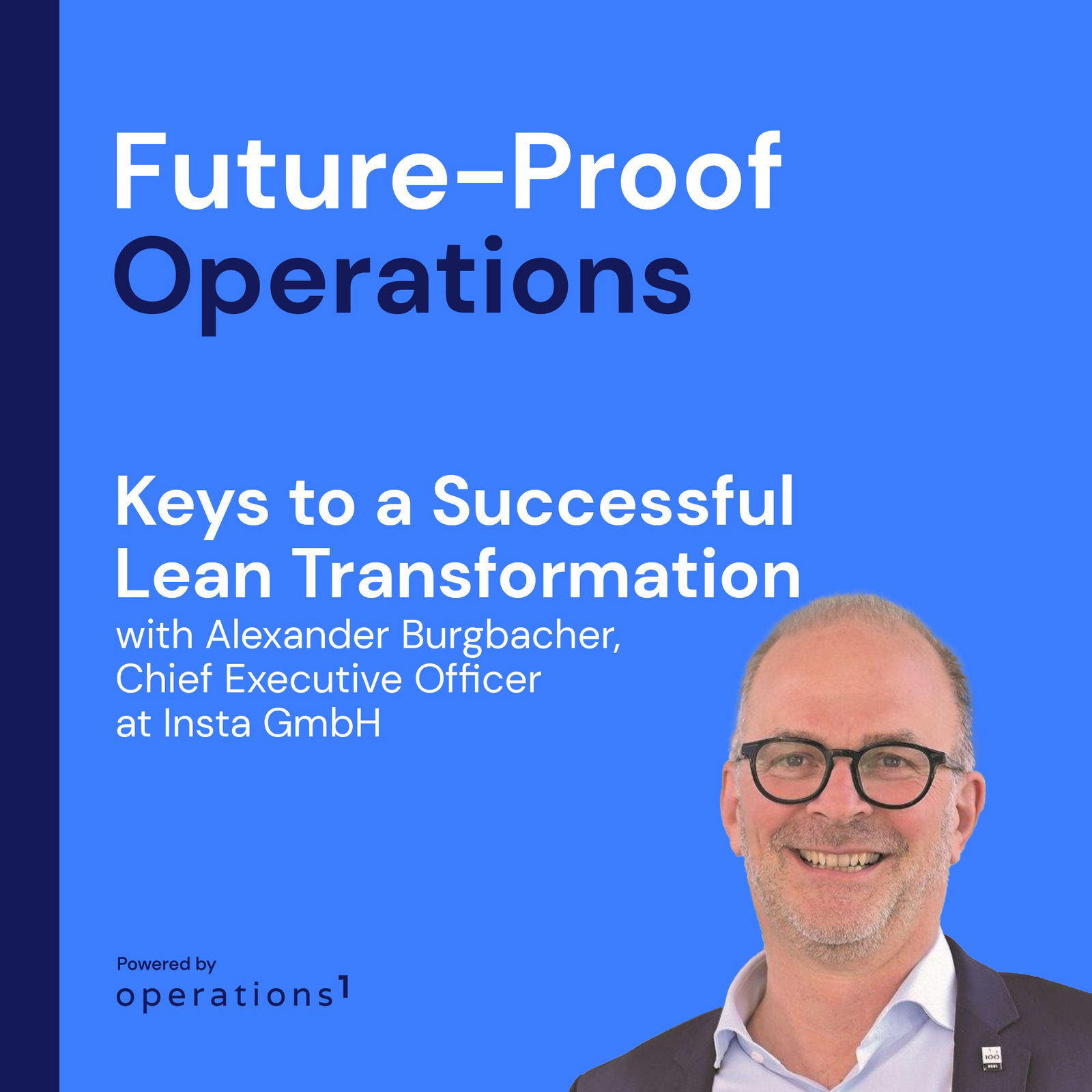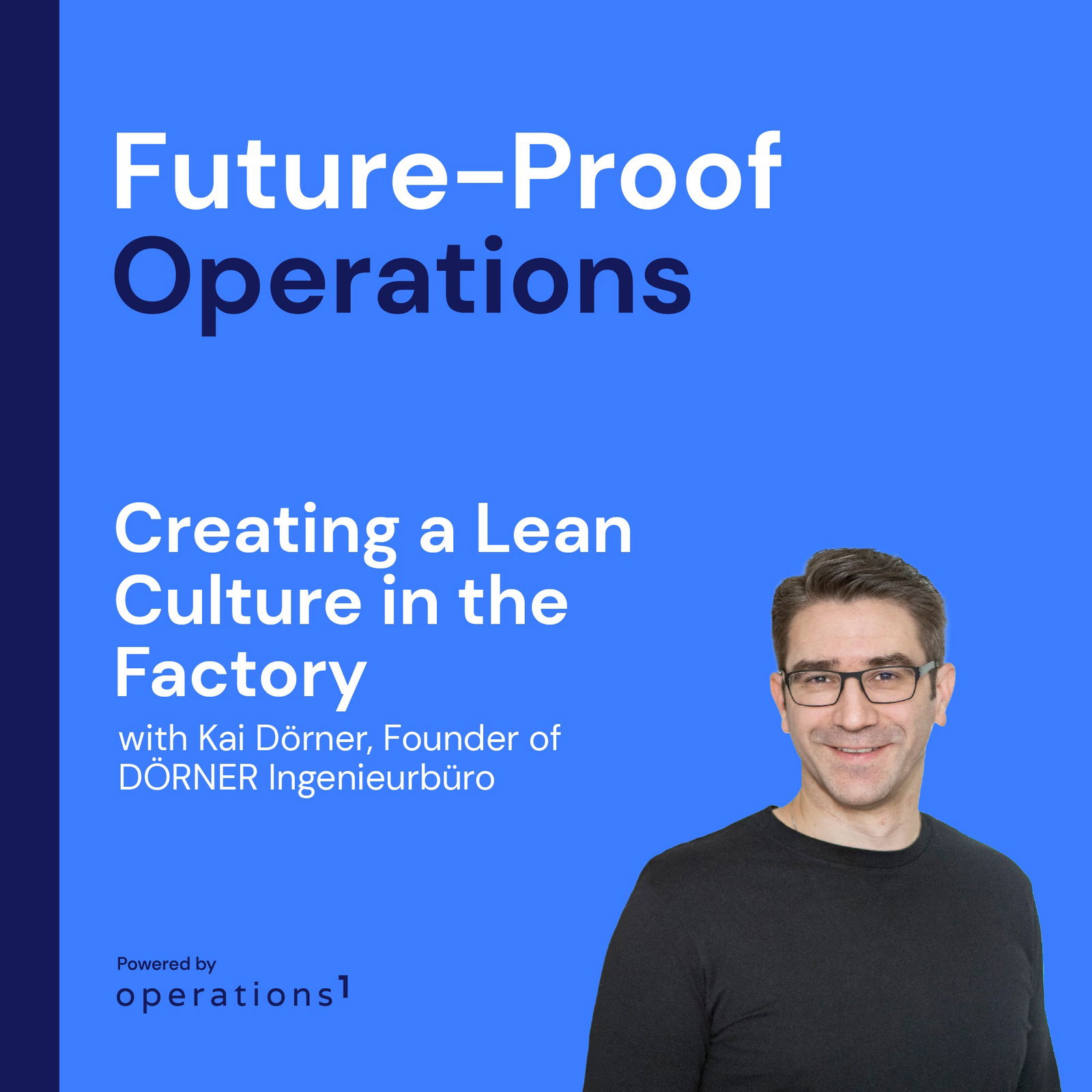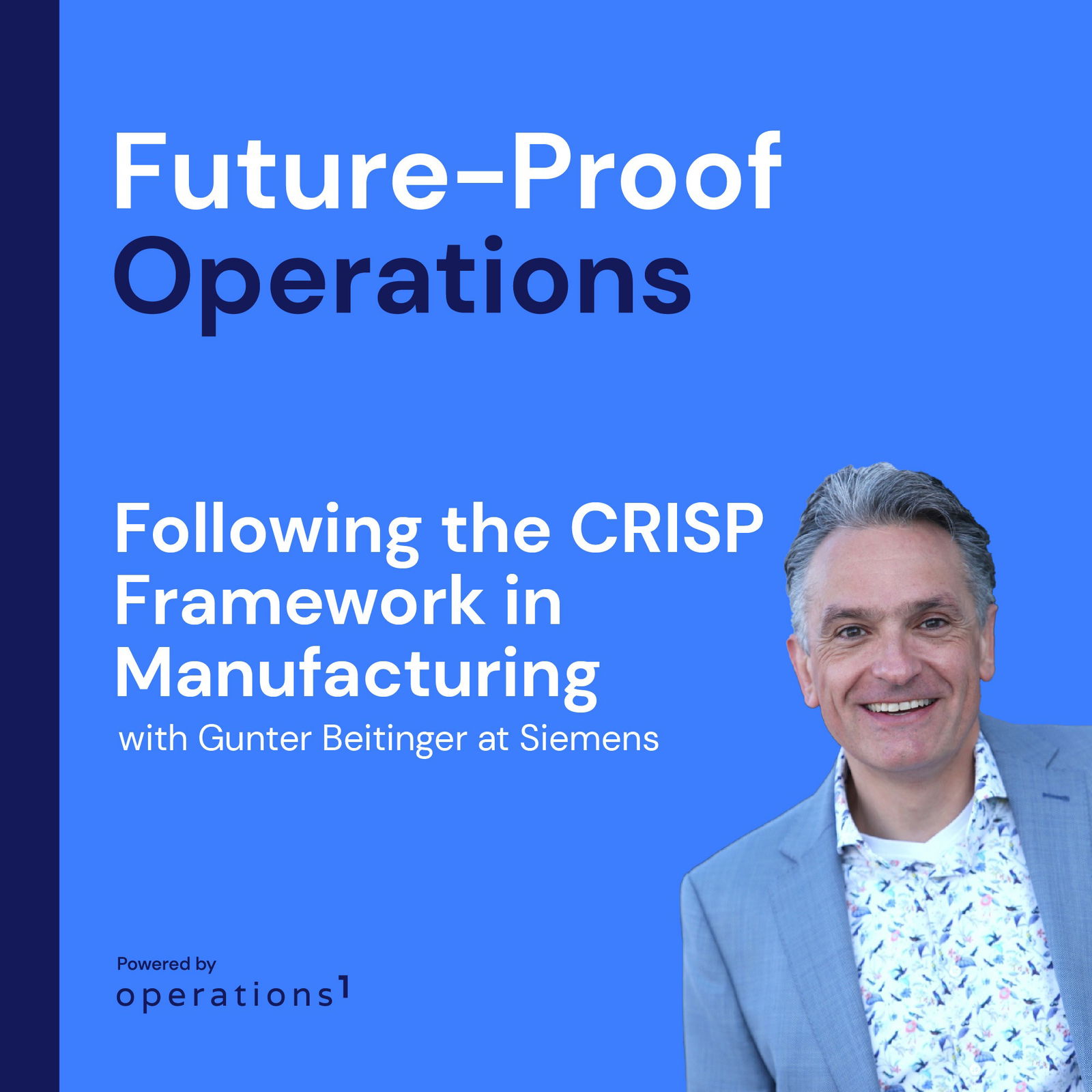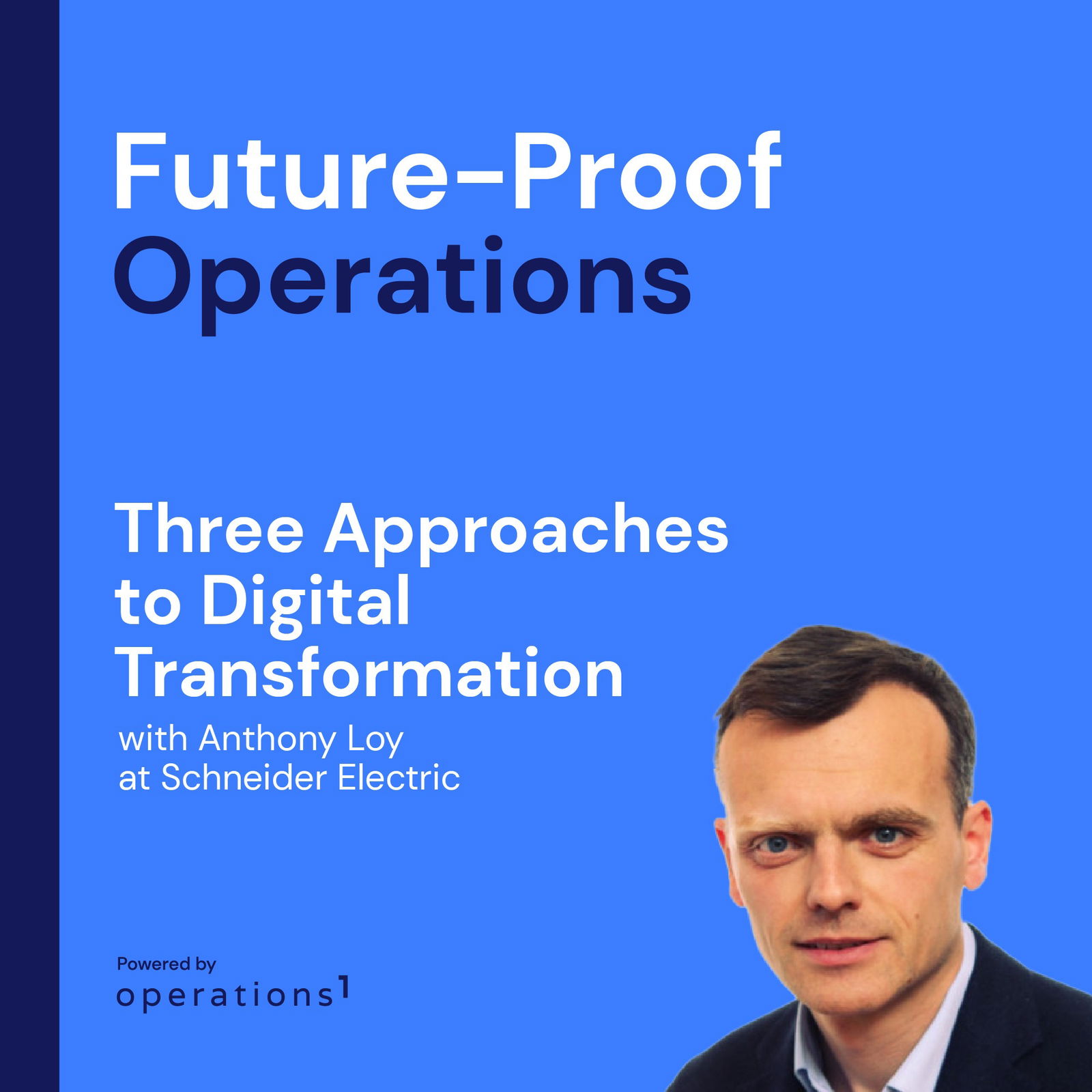Discover Future Proof Operations | Exploring Digital Manufacturing Operations, Industrial Automation
Future Proof Operations | Exploring Digital Manufacturing Operations, Industrial Automation

Future Proof Operations | Exploring Digital Manufacturing Operations, Industrial Automation
Author: Operations1
Subscribed: 6Played: 47Subscribe
Share
© 2022
Description
The work that happens on the front line of the manufacturing sector is the key to driving future readiness.
On each episode, we bring you conversations with global leaders in industrial companies. Our goal is to discuss trends, stories, and people in digital manufacturing, and offer the latest insight into solutions. Subscribe and be sure to check out our website for more resources at operations1.com.
If you enjoyed today’s show, please leave a 5-Star review. For more information and links to all of the resources mentioned in today’s episode, visit operations1.com.
On each episode, we bring you conversations with global leaders in industrial companies. Our goal is to discuss trends, stories, and people in digital manufacturing, and offer the latest insight into solutions. Subscribe and be sure to check out our website for more resources at operations1.com.
If you enjoyed today’s show, please leave a 5-Star review. For more information and links to all of the resources mentioned in today’s episode, visit operations1.com.
42 Episodes
Reverse
On this podcast, Marco Chacin, Lead Engineer at Airbus, joins the show to discuss the role of robotics in aerospace manufacturing and the future of AI integration.Key Takeaways:(03:06) Significant global shifts in robotics innovation over the past two decades.(04:15) The division between physically capable robots and intelligent systems.(05:28) Prediction of the convergence of robotics and AI technologies.(06:10) A typical day in aerospace manufacturing and its complexities.(08:58) Challenges in automating aerospace manufacturing due to size and precision.(10:10) Additional challenges in precision and operation speed in robotics.(15:36) Logistics as a potential area for effective robotic automation.(19:18) Current state and future of AI in robotics, focusing on industrial applications.(28:22) Marco's vision for the future of factories, blending human skills and robotic automation.Resources Mentioned:Marco Chacin -https://www.linkedin.com/in/mchacin/Airbus | LinkedIn -https://www.linkedin.com/company/airbusgroup/Airbus | Website -https://www.airbus.com/enBoston Dynamics -https://bostondynamics.com/Agile Robotics -https://www.agile-robots.com/en/ChatGPT -https://openai.com/chatgpt/Honda Robotics -https://global.honda/en/robotics/Google Home -https://home.google.com/welcome/Amazon Alexa -https://alexa.amazon.com/If you enjoyed today’s show, please leave a 5-star review. For more information and links to all of the resources mentioned in today’s episode, visit operations1.com.#Operations #Manufacturing #IndustrialAutomation
On this episode, Jonas Meisinger, Head of Quality and Environmental Management, Production Development and Plant Management at RINGSPANN GmbH, discusses manufacturing, quality management and the transformative power of digitalization within RINGSPANN.Key Takeaways:(02:31) Jonas' passion for data-driven problem-solving in manufacturing.(03:31) Jonas' rise from apprentice to leadership within RINGSPANN.(04:22) Key RINGSPANN milestones: SAP introduction, facility expansions and global growth.(06:21) Modernization and standardization challenges at RINGSPANN's German site.(08:14) Implementing a shop floor management project to target efficiency and process transparency.(09:55) Addressing change management in shop floor project implementation.(11:12) Enhancing productivity with digital control and real-time data at RINGSPANN.(13:35) Success with a standardized continuous improvement process initiated in 2020.(15:56) Use of an analog whiteboard for continuous improvement feedback.(17:11) Quality management through automation, data analysis and continuous improvement.(18:54) Future vision for RINGSPANN: innovation, sustainability and data-driven operations.Resources Mentioned:Jonas Meisinger -https://www.linkedin.com/in/jonas-meisinger/RINGSPANN GmbH | LinkedIn -https://www.linkedin.com/company/ringspanngmbh/RINGSPANN GmbH | Website -https://www.ringspann.com/enIf you enjoyed today’s show, please leave a 5-star review. For more information and links to all of the resources mentioned in today’s episode, visit operations1.com.#Operations #Manufacturing #IndustrialAutomation
On this episode, Mathias Johansson, Chief Information Officer of Alleima, discusses manufacturing complexities, talent acquisition and retention, and the significant impact of technology integration in modernizing operations and fostering innovation in manufacturing.Key Takeaways:(02:22) Alleima's role in advanced materials and its integrated value chain.(03:09) Mathias' lifelong connection with manufacturing and ERP systems.(03:51) Critical challenges in manufacturing: talent acquisition and technological complexity.(04:48) Talent retention issues and the concept of the "silver tsunami."(05:13) The complexity of integrating diverse manufacturing technologies.(06:22) Addressing the talent gap and technological integration as key challenges.(08:01) Lowering entry barriers for new engineers through digitalization.(09:10) The need for companies to adapt to changing workforce expectations.(10:11) Implementing digital twins and gamification in training.(11:10) The potential for remote training and flexible work environments in manufacturing.(12:23) The balance between attracting talent and automating processes.(14:29) The increasing complexity in manufacturing due to new technologies.(17:12) Process integrity is key to addressing manufacturing complexity.(23:17) A vision for future factories with integrated data and automation advancements.Resources Mentioned:Mathias Johansson -https://www.linkedin.com/in/mathias-johansson-b740414/Alleima | LinkedIn -https://www.linkedin.com/company/alleima/Alleima | Website -https://www.alleima.com/If you enjoyed today’s show, please leave a 5-star review. For more information and links to all of the resources mentioned in today’s episode, visit operations1.com.#Operations #Manufacturing #IndustrialAutomation
On this episode, Dave Griffith, President of Capelin Solutions and Co-Host of the Manufacturing Hub Network, joins host Benjamin Brockmann. They discuss the advancements and challenges within the manufacturing sector, with a particular focus on manufacturing execution systems (MES) and connected worker platforms.Key Takeaways:(02:27) Capelin Solutions was founded for problem-solving in manufacturing.(03:09) Dave’s passion for manufacturing is an opportunity for problem-solving and innovation.(04:57) MES versus connected worker platforms and modern technology adoption.(05:55) MES’s role in data collection and production improvement.(11:42) Connected worker platforms are on the rise, used for capturing and utilizing experienced workers’ knowledge.(14:06) A successful case of a connected worker platform in a food and beverage company.(18:08) Digitizing maintenance through connected platforms results in cost savings and efficiency.(22:14) Predictions on the future integration of MES and connected worker platforms.(24:07) Recommendations for CIOs on implementing connected worker platforms, including technology selection and strategic rollout.Resources Mentioned:Dave Griffith - https://www.linkedin.com/in/davegriffith23/Capelin Solutions - https://www.linkedin.com/company/capelin/Manufacturing Hub Network - https://www.linkedin.com/company/manufacturing-hub-podcast-network/Dave Griffith’s Website - https://dave-griffith.com/work-together/If you enjoyed today’s show, please leave a 5-star review. For more information and links to all the resources mentioned in today’s episode, visit operations1.com.#Operations #Manufacturing #IndustrialAutomation
On this episode, Kenton Robbins, Group Managing Director of PFF Packaging Group, joins Benjamin Brockmann to discuss the intersection of innovation, sustainability and leadership within the packaging industry.Key Takeaways:(02:20) An overview of PFF Packaging’s sites and workforce.(03:50) PFF Packaging has diverse manufacturing processes.(05:39) Innovation and sustainability are necessary in packaging.(06:50) The innovative culture within PFF Packaging is driven by leadership.(08:55) Balancing innovation with cost and return on investment.(09:08) Leadership principles foster an innovative mindset.(10:30) There are challenges and rewards of being innovative in the packaging industry.(13:53) Focus on return on investment and consolidation after significant capital investment.(14:43) Emphasis on data capture and lean manufacturing through systemization and automation.(17:24) The vision for PFF Packaging in the next 10 years, including technology growth and innovation.Resources Mentioned:Kenton Robbins - https://www.linkedin.com/in/kentonrobbins/PFF Packaging Group - https://pff.uk.com/If you enjoyed today’s show, please leave a 5-star review. For more information and links to all of the resources mentioned in today’s episode, visit operations1.com.#Operations #Manufacturing #IndustrialAutomation
On this episode, Rudolf Pospisil, Chemical Process and Innovation Specialist, joins Benjamin to discuss key insights into the chemical industry, innovation and the future of sustainability.Key Takeaways:(02:07) The state of the chemical industry and the concept of a dark factory.(02:22) Explaining the history and current state of the chemical industry.(04:02) Challenges of innovation in the chemical industry.(05:11) Current approaches to innovation, focusing on new processes and sustainability.(06:55) The importance of chemical engineering in the modern chemical industry.(09:31) The role of AI and digitalization in the chemical industry's process optimization.(11:30) The contribution of the demo/pilot plant in implementing optimizations.(13:39) The reality and vision of automated 'dark' factories in the chemical industry.(15:25) Sustainability in the chemical industry, its current impact and future plans.(18:13) Rudolf's outlook on the future of the industry and sustainability challenges.If you enjoyed today’s show, please leave a 5-star review. For more information and links to all of the resources mentioned in today’s episode, visit operations1.com.#Operations #Manufacturing #IndustrialAutomation
On this episode, Erik Wirsing, VP of Global Innovation at DB Schenker, joins Benjamin Brockmann to provide key insights into logistics and supply chain innovation. Key Takeaways:(02:52) The distinction between supply chain and logistics.(04:36) An overview of logistics industry challenges, including digitalization and personnel shortages.(06:39) An introduction to three pillars of innovation: automation, sustainability and visibility/digitalization.(09:10) Near-term implementation of autonomous trucks.(11:07) Legal and technological advancements in autonomous driving.(13:23) Accelerators in autonomous driving technology over recent years.(15:19) The concept of remote driving and its potential impact.(17:08) The necessity of 5G connectivity for autonomous logistics operations.(19:03) The need for a governing body for autonomous vehicle traffic management.(22:51) Electric versus other technology trucks for future logistics.(26:37) Bets on electromobility and innovative charging solutions.(28:05) The role of data in enhancing visibility and efficiency in logistics.(30:32) The importance of real-time tracking and sensor integration for shipment quality.(32:06) Technical challenges in achieving comprehensive logistics visibility.(35:21) The future outlook on logistics innovation, including hyperloops and cargo drones.Resources Mentioned:Erik Wirsing - https://www.linkedin.com/in/erik-wirsing/DB Schenker - https://www.dbschenker.com/globalIf you enjoyed today’s show, please leave a 5-star review. For more information and links to all of the resources mentioned in today’s episode, visit operations1.com.#Operations #Manufacturing #IndustrialAutomation
On this episode, Dr. Martin Schwemmer, Logistics Market Observer, Advisor, Mentor and former Managing Director of BVL (Bundesvereinigung Logistik), discusses trends and challenges in the logistics industry.Key Takeaways:(03:18) Martin’s interest in logistics, influenced by his academic journey.(04:21) An overview of the logistics industry, including market segments and revenue models.(07:10) Current trends and challenges in logistics, highlighting cost pressure and sustainability.(10:04) Strategies against cost pressure in logistics, focusing on digitalization.(14:07) The role of startups in driving innovation in the logistics sector.(18:04) Innovation in established logistics firms and their discrete technology adoption.(18:58) Promising technologies in logistics: supply chain visibility and urban logistics.(22:30) Evolving workforce roles in logistics and the impact of automation on operations.(26:43) Addressing logistics talent shortage through digitalization and automation.(27:36) Martin’s future vision for logistics, shifting from cost to value addition.Resources Mentioned:Dr. Martin Schwemmer - https://www.linkedin.com/in/martin-schwemmer-8493ba168/BVL - Bundesvereinigung Logistik - https://www.bvl.de/If you enjoyed today’s show, please leave a 5-star review. For more information and links to all of the resources mentioned in today’s episode, visit operations1.com.#Operations #Manufacturing #IndustrialAutomation
On this episode, Manuel Peter, Group Leader Smart Factory Technologies at ITK Engineering, explores a range of topics around smart factory technologies and digitization in manufacturing. Key Takeaways:(03:10) The transition from mechanical engineering to smart factory and Industry 4.0.(05:01) Customized software vs standard software in manufacturing companies.(09:11) The role of clear software architecture in development and maintenance.(12:06) The stages of a digitization project in a manufacturing company.(14:09) The role of proof of concept in minimizing risks and testing new technology elements.(15:25) The development phase involves both ITK and customer developers working jointly.(18:21) Utilization of CI/CD pipelines for efficient software development and deployment.(21:30) Manuel's vision for the future of factories, focusing on AI and robotics integration.Resources Mentioned:Manuel Peter - https://www.linkedin.com/in/manuel-peter-50a3031aa/ITK Engineering - https://www.itk-engineering.de/en/If you enjoyed today’s show, please leave a 5-star review. For more information and links to all of the resources mentioned in today’s episode, visit operations1.com.#Operations #Manufacturing #IndustrialAutomation
We welcome back Justin Hodges, Senior AI/ML Technical Specialist (Product Management) at Siemens Digital Industries Software, for further expert insights on AI and machine learning in the manufacturing sector.Key Takeaways:(02:29) A project on anomaly detection in engines.(03:54) The goal of using AI-driven anomaly detection to replace manual checks.(04:22) Implementation of an unsupervised AI framework for anomaly detection.(07:51) Essentials for implementing ML in factories.(10:24) Strategies for deploying ML in existing IT infrastructures.(17:33) Introduction of AI in assembly line planning.(19:32) Use of cloud-based apps for real-time assembly line planning.(21:12) Shift from traditional to AI-driven real-time predictions.(23:31) Overview of technologies used in assembly line projects.(27:00) Simplicity and minimal tech hurdles in project implementation.(29:09) Advice for CIOs: expect AI integration in vendor products.Resources Mentioned:Justin Hodges - https://www.linkedin.com/in/justin-hodges-phd-3432a58b/Siemens Digital Industries Software - https://www.siemens.com/global/en.htmlIf you enjoyed today’s show, please leave a 5-star review. For more information and links to all of the resources mentioned in today’s episode, visit operations1.com.#Operations #Manufacturing #IndustrialAutomation
On this episode, Justin Hodges, Senior AI/ML Technical Specialist in Product Management at Siemens Digital Industries Software, joins host Benjamin Brockmann. They delve into various aspects of AI and machine learning in the manufacturing sector and its impact on roles and processes.Key Takeaways:(04:40) Explanation of AI and machine learning relationship.(05:36) Machine learning in regression and classification.(08:10) Hodges’ daily work in AI/ML product management.(09:47) AI/ML applications in manufacturing.(12:26) AI/ML transforming roles in manufacturing.(17:34) Need for adaptability in AI/ML advancements.(20:04) Future of AI and ML in simple applications and mass adoption.(23:53) Promising AI/ML implementations in manufacturing and CAE.(27:06) Conclusion and anticipation for future AI/ML project discussions.Resources Mentioned:Justin Hodges - https://www.linkedin.com/in/justin-hodges-phd-3432a58b/Siemens Digital Industries Software - https://www.sw.siemens.com/en-US/For more information and links to all of the resources mentioned in this podcast, visit Operations 1.If you enjoyed today’s show, please leave a 5-star review. For more information and links to all of the resources mentioned in today’s episode, visit operations1.com.#Operations #Manufacturing #IndustrialAutomation
On this episode, Joachim Schaut, Senior Vice President of Intercontinental Supply Chain Solutions of DB Schenker, joins Benjamin Brockmann to discuss the intricacies of supply chain solutions and the role of digitization in the industry.Key Takeaways:(08:49) The significance supplier performance plays in optimizing inventory cycles.(09:09) The potential data-driven decisions hold in supply chain management.(09:46) The role artificial intelligence carries in automating supply chain decisions.(15:58) How Joachim’s perspective on investing in proprietary solutions differs from market standards for long-term security.(16:15) The risks associated with deploying new software solutions and the importance of phased implementations.(16:48) How significant it is for a project team to consider the overall picture, not just the pilot phase.(17:09) The ideal timeline for order management and freight management implementations.(18:13) The continued use of legacy technologies like Excel and email in supply chain management.(19:04) The challenges involved in managing data across various supply chain partners and the move toward more integrated solutions.(20:26) The role change management plays in the transition to new digital tools.(21:23) Identifying the differences in digital adoption and openness to change between North America and Europe.(23:23) Highlighting the relationship between supply chain digitization and sustainability efforts.Resources Mentioned:Joachim Schaut - https://www.linkedin.com/in/joachim-schaut-a8a00a171/DB Schenker - https://www.linkedin.com/company/dbschenker/If you enjoyed today’s show, please leave a 5-star review. For more information and links to all of the resources mentioned in today’s podcast, visit operations1.com.#Operations #Manufacturing #IndustrialAutomation
We’re joined on this episode by Chris Luecke, Podcast Host and Founder of "Manufacturing Happy Hour.” Benjamin and Chris delve into the state of manufacturing in the United States and Europe and discuss the role of digitization in the industry.Key Takeaways:(00:11) Chris Luecke’s background in manufacturing and his journey with Rockwell Automation.(00:34) Introduction to Chris’ podcast, “Manufacturing Happy Hour.”(01:06) A comparison between the state of digitalization in the US and Europe.(02:56) The changing perception of manufacturing in the US and its evolution.(15:25) The importance of long-term thinking in manufacturing and the role of digitization.(16:17) The impact of automation on the workforce: Is it replacing or empowering them?(21:14) The significance of cross-functional teams in driving digitization and transformation.(22:32) The concept of micro-transformations and the role of the workforce in driving innovation.(24:31) The importance of experimentation and iterative improvements in manufacturing.Resources Mentioned:Chris Luecke - https://www.linkedin.com/in/cwluecke/”Manufacturing Happy Hour” - https://www.manufacturinghappyhour.com/Rockwell Automation - https://www.rockwellautomation.com/If you enjoyed today’s show, please leave a 5-star review. For more information and links to all of the resources mentioned in today’s episode, visit operations1.com.#Operations #Manufacturing #IndustrialAutomation #Digitization
On this episode, Janis Bargsten, Chief Commercial Officer at SEAFAR, joins host Benjamin Brockmann to talk about the following topics:- Decarbonization efforts and personnel shortage in inland shipping.- Seafar’s origin and vision for autonomous shipping.- Regulatory challenges and development of goal-based shipping standards.- Safety implications and benefits of autonomous shipping.- Enhancing ship owners’ competitiveness and attracting personnel.- Centralization of safety and cognitive load reduction.- Steps for ship owners to take to adopt autonomous shipping.- A vision for the future of autonomous shipping in Europe.Resources mentioned:Janis Bargsten - https://www.linkedin.com/in/janis-bargsten-7411a023/Seafar - https://seafar.eu/If you enjoyed today’s show, please leave a 5-star review. For more information and links to all of the resources mentioned in today’s episode, visit operations1.com.#Operations #Manufacturing #IndustrialAutomation
On this episode, Philipp Menz, Plant Manager at Schunk Group, joins host Benjamin Brockmann to talk about the following topics:- Leadership challenges in manufacturing.- Adapting leadership styles to cater to changing workforce dynamics, including Gen Y and Gen Z preferences.- The importance of building strong team bonds and connections to the company for enhanced employee engagement and productivity.- Shifting from a one-size-fits-all leadership approach to coaching existing leaders in modern leadership styles.- Using team-building activities to bridge departmental and generational gaps, improve safety rates, reduce sickness rates and increase productivity.- Aligning different generations by tailoring leadership to various employee expectations.- Fostering community among employees and promoting cross-departmental interactions.Resources mentioned:Philipp Menz - https://www.linkedin.com/in/philipp-menz-standortleiter/Schunk Group - https://www.linkedin.com/company/schunk-group/Schunk Group | Website - https://www.schunk-group.com/deIf you enjoyed today’s show, please leave a 5-star review. For more information and links to all of the resources mentioned in today’s episode, visit operations1.com.#Operations #Manufacturing #IndustrialAutomation
On this episode, Markus Börner, Founding Partner at Prequel Ventures, and Daniel Goldeband, Co-Founder & CEO at i-flow, join host Benjamin Brockmann to talk about the following topics:- The state of startups and technology adoption in Europe. - The role of venture capital firms in boosting the startup ecosystem and supporting innovation. - Challenges in working with big enterprises and manufacturing companies due to risk aversion. - The potential role of politics and regulations in encouraging technology adoption and creating new markets. - Venture capital’s role in fueling startups and providing them a runway to bring their products to market.- Startups’ understanding of the pain points of manufacturing companies.- Bridging the gap between technology startups and manufacturing companies.Resources mentioned:Markus Börner - https://www.linkedin.com/in/markus-boerner-scm/Prequel Ventures - https://prequelvc.com/Daniel Goldeband - https://www.linkedin.com/in/daniel-goldeband-bb927b109/i-flow - https://i-flow.io/en/If you enjoyed today’s show, please leave a 5-star review. For more information and links to all of the resources mentioned in today’s episode, visit operations1.com.#Operations #Manufacturing #IndustrialAutomation
On this episode, Alexander Burgbacher, Chief Executive Officer at Insta GmbH, joins host Benjamin Brockmann to talk about the following topics:- Alexander’s career and background and an overview of Insta.- Lean management and lean production.- The importance of people in a successful lean transformation.- The role that transparency plays in a lean transformation.- The major changes the lean transformation made in employees’ day-to-day work.- Getting leadership on board to embrace honesty and transparency.- Best practices for a lean transformation.- Patience in a lean transformation, which takes a long time.Resources mentioned:Alexander Burgbacher - https://www.linkedin.com/in/alexander-burgbacher-5474b4250/Insta GmbH - https://www.linkedin.com/company/insta-gmbh/Insta GmbH | Website - https://www.insta.de/deIf you enjoyed today’s show, please leave a 5-star review. For more information and links to all of the resources mentioned in today’s episode, visit operations1.com.#Operations #Manufacturing #IndustrialAutomation
On this episode, Kai Dörner, Founder of DÖRNER Ingenieurbüro, an engineering office and management consultancy offering individual support in the areas of Lean management, process and production optimization, and industrial engineering, joins host Benjamin Brockmann to talk about the following topics:- Lean management and production optimization.- The changes, and lack of changes in many cases, that have occurred recently in the factory setting. - Changing the optimization focus from an internal view to a customer-centric one.- The importance of people and culture when taking a Lean approach.- Clearly identifying problems and their causes before attempting to formulate a solution.- The focus in the future on digitization of factory processes.Resources mentioned:Kai Dörner - https://www.linkedin.com/in/kaidoerner/DÖRNER Ingenieurbüro - https://www.linkedin.com/company/doerner-ing/DÖRNER Ingenieurbüro | Website - https://www.doerner-ing.com/If you enjoyed today’s show, please leave a 5-star review. For more information and links to all of the resources mentioned in today’s episode, visit operations1.com.#Operations #Manufacturing #IndustrialAutomation #digitization #lean
On this episode, Gunter Beitinger, VP of Manufacturing, Head of Factory Digitalization and Head of Product Carbon Footprint at Siemens, joins host Benjamin Brockmann to talk about the following topics:- How manufacturing companies should adapt and respond to different types of crises. - The opportunities offered by the power of moving to the cloud.- Ensuring there is robustness and resilience through transparency in the supply chain.- Using AI to reduce manufacturing defects.- The importance of sustainability in production.- People-centricity in the manufacturing environment.- The future of large language model AI tools to solve problems on the shop floor.- Using the CRISP Framework as a guiding principle in manufacturing.Resources mentioned:Gunter Beitinger - https://www.linkedin.com/in/gunter-dr-beitinger/Siemens - https://www.siemens.com/global/en.htmlIf you enjoyed today’s show, please leave a 5-star review. For more information and links to all of the resources mentioned in today’s episode, visit operations1.com.#Operations #Manufacturing #IndustrialAutomation
On this episode, Anthony Loy, VP of Industrial Digital Transformation Consulting at Schneider Electric, joins host Benjamin Brockmann to talk about the following topics:- How technology used to improve athletic performance applies to manufacturing.- Making a digital transformation a disruptive change, not an incremental change.- The pros and cons of a decentralized approach to transformation on a global scale.- The standardization benefits with an engineering approach to transformation.- The high value impact with C-level program driven transformations. - The changes coming in the next five to ten years in approaches to digital transformationResources mentioned:Anthony Loy - https://www.linkedin.com/in/anthonyloy/Schneider Electric - https://www.linkedin.com/company/schneider-electric/Schneider Electric |Website - https://www.se.com/If you enjoyed today’s show, please leave a 5-star review. For more information and links to all of the resources mentioned in today’s episode, visit operations1.com.#Operations #Manufacturing #IndustrialAutomation


